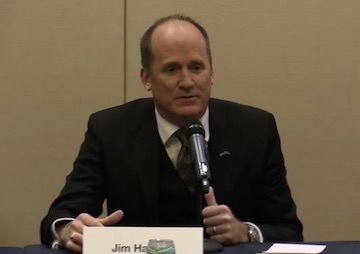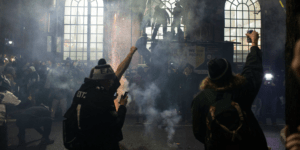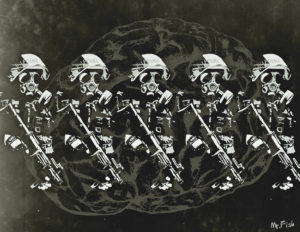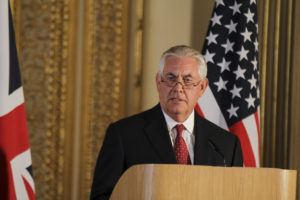A Look at the Troubling Worldview of Ted Cruz’s Foreign Policy Adviser
A close-up on Jim Hanson offers a remarkable window into the mentality of Cruz's national security team. YouTube
YouTube
When a presidential front-runner picks his or her advisors, the candidate is sending a signal about who will staff a potential future administration and devise policies for the world’s lone superpower.
Among the handful of figures named as national security advisors for the campaign of Ted Cruz — currently the choice of the Republican establishment — is Jim Hanson. Practically unknown by the general public, Hanson is the executive vice president for the Center for Security Policy, a far-right group described by the Southern Poverty Law Center as “a conspiracy-oriented mouthpiece for the growing anti-Muslim movement in the United States.”
Hanson’s bio markets him as a special forces veteran who offers the “expertise of a practitioner of the art of war.” In an exclusive interview, AlterNet learned a lot about the kind of war that Hanson thinks should be waged on U.S. soil. It is a war in which police would target Muslim neighborhoods, though he couldn’t name a single one that should be patrolled; where law enforcement would profile by religion and potentially race, though he wasn’t sure if race should be a factor; and where Syrian refugees seeking safe haven would be vetted to ensure they are Christian, while Muslims are turned away.
Here is the vision outlined by an individual who could be tapped for the National Security Council or perhaps the Pentagon under a potential Cruz administration. (Hanson asked AlterNet to make it clear that he is an advisor to the Cruz campaign as a private citizen, not as a “work-related function” for his job at the Center for Security Policy.)
Limitless and Ill-Defined Patrolling of Muslim Communities
Cruz faced widespread outrage and rebuke after he declared last month, in the wake of the Brussels attacks, “We need to empower law enforcement to patrol and secure Muslim neighborhoods before they become radicalized.” Cruz’s advisor Frank Gaffney, an anti-Muslim conspiracy theorist who founded the Center for Security Policy and is included on the Southern Poverty Law Center’s hate list—rushed to Cruz’s defense last week.
During our interview, Hanson appeared to follow Gaffney’s lead. “There’s only one place you will find jihadists, and that’s in Muslim neighborhoods,” he said. “You want to find them, that’s where you look.”
But just like Cruz, Hanson could not identify a single neighborhood.
Instead, Hanson rattled off the names of cities that happen to have sizeable Muslim populations. “I don’t know that there are any particular ones that are more egregious than others. I’d say that the Islamic society of Boston has a long history of jihadists associated with it,” he stated, citing discredited smears by neoconservatives like Stephen Emerson.
Hanson added: “Minneapolis has a problem with the Somali community there that I think deserves a little scrutiny.”
Pressed again to name a single neighborhood, Hanson shifted direction, arguing for vague and geographically limitless policing powers. “I think when the Senator said patrolling Muslim neighborhoods, I don’t know that he was speaking geographically as much as he was speaking of Muslim communities which are generally centered around Islamic centers and other sorts of things,” he said.
After I pressed him again, Hanson scolded me for “focusing on the word neighborhood or a geographic thing.” He advised, “I’ve said it many times, it’s not neighborhoods. It was the word he used, but the implication it was not neighborhoods as in Georgetown in Washington or Arlington in Washington as much as it is the fact that there are communities that may not be geographically distinct as much as they are tied to a particular religious, err, community group.”
Hanson clarified that, when he references “religious groups,” he is talking about Muslims.
A Partial Defense of Racial Profiling
Hanson’s plan sounds a lot like escalated police profiling and surveillance of Muslims and people of color, an abhorrent policy that is already practiced in the United States.
Hanson confirmed that, yes, that is exactly what he means, stating: “I think profiling based on a number of characteristics is an excellent tool for law enforcement and security forces and that religion could be one of those in a number of circumstances, absolutely, along with country of origin, along with age, along with sex.”
Hanson then proceeded to issue a disturbing—if wavering—defense of racial profiling.
I asked, “Do you think race should be included as one of those characteristics?”
He replied, “Well, not as much.”
I pressed him: “But a little?”
“Eh, I don’t know,” he said. “It would depend. So I would say, it wouldn’t be one of the primary ones, for sure.”
When I asked, again, if he is prescribing police profiling according to race, he paused and then replied, “Um, no. How about no. I’ll go with no. If I was going to start, that’s not one of the things I would put in the initial profile.”
A Religious Witch-Hunt for Vetting Syrian Refugees as Christians
Like Cruz, or ousted presidential hopeful Jeb Bush for that matter, Hanson believes that the U.S. should grant Christian Syrian refugees safe haven while turning Muslims away. “Among the Syrian Islamists, you can’t tell who’s who. You have difficulty among Syrian Muslims telling who the good guys are and the bad guys,” he said. “But with the Christian community, which is a lot smaller, I think you could make the case that they were persecuted and they are the priority.”
Of course, the claim that Muslims pose a greater threat is patently false. There is a long and disturbing history of domestic terrorism committed by people of Christian backgrounds, from the Oklahoma City bombing to the Charleston church massacre. A report released last year by the New America research group found that, since September 11, 2001, non-Muslim domestic terrorists posed the greatest security threat.
Hanson perhaps best made this point himself when he responded to my question, “Can you name one person who came to the U.S. as a Syrian refugee and committed an act of terror of violence?”
“No, I don’t think so,” he replied.Nonetheless, Hanson wants to institute a vaguely defined vetting process to identify Christian refugees so that they can be granted sanctuary. Under his plan, the methodology involves contacting Syria’s “Christian community” to identify each individual’s lineage.
“Number one, you have access to the leaders of the Christian community there and you can ask them and these family lines are known,” he said. “The Christian community is fairly small and insular. So it would be fairly easy to know, because everyone in those communities knew the members of their community.”
“Since the larger Syrian population is majority-Muslim, you would have no way of knowing and no definitive way to do it,” he said. “And the FBI director himself has said there is no way to vet Syrian Muslim refugees to tell who are jihadists and who are not. So I think you could do that effectively with the Christian community because it is that much smaller.”
It was not immediately clear how exactly this practice would be implemented. For example, how far back would one’s lineage have to go for one to be considered sufficiently Christian? Who exactly are these Christian leaders, and how will the U.S. government contact them?
From all angles, the proposal violates the most fundamental human rights and is “just wrong,” Dena Sher, assistant legislative director at Americans United for Separation of Church and State, told AlterNet. “The government cannot set criteria for who is Christian and who is a good Christian in any way shape or form because that would violate the establishment clause, which is designed to protect religion and government from unduly influencing each other,” Sher continued.
Christians, of course, are not the only persecuted minorities or people in Syria. Furthermore, the current vetting process for all people seeking refugee status in the United States is already incredibly burdensome, discriminatory and prohibitive, including at least 21 steps that can take years. Over the past five years, the United States has taken in just 3,000 Syrian refugees, a fraction of the at least 4.8 million who are externally displaced. Furthermore, Obama is currently overseeing the mass deportations of Muslim Bangladeshi asylum seekers.
Under the guise of protecting persecuted Christian minorities, Hanson is calling for Muslims to be persecuted by the United States.
‘Us Versus Them’ Mentality
Hanson had to get off the phone before we could fully dive into foreign policy. He did confirm that he questions the official story of Ahmed Mohamed, the 14-year-old boy arrested in Irving, Texas last year for bringing a clock to high school.
“So I think the odds that this was a kid who was smart enough to build something on his own, that he decided to take a radio shack clock out of its case and put it in a pencil case and take it to school and show it to six teachers in six classes before one of them finally told him that that was too much, I think that’s suspicious, and I think anyone who doesn’t think it’s suspicious is not paying attention,” he said.
I first decided to request an interview with Hanson when I saw him on Twitter launching personal attacks against AlterNet senior editor Max Blumenthal. At one point, Hanson labeled Blumenthal a “#jihadbag.” He explained to me over the phone that the term “was a neologism combining the words ‘jihad’ and ‘[douchebag]’ for him personally.”
Merging fear mongering over “jihad” with frat house humor about the female anatomy, Hanson offered a remarkable look at the mentality of Cruz’s national security team — a group of like-minded advisors who could potentially steer policies for the world’s lone superpower.
Towards the end of our interview, he said the military has been “rid up hard and put up wet” and needs “a ton of maintenance and personnel issues” to be addressed.
“And I think doing that will remind the world that the U.S. military is the biggest force for good this word has ever known,” Hanson said, “and if you’re a bad guy you should fear them and hope they’re never coming your way.”
Your support matters…Independent journalism is under threat and overshadowed by heavily funded mainstream media.
You can help level the playing field. Become a member.
Your tax-deductible contribution keeps us digging beneath the headlines to give you thought-provoking, investigative reporting and analysis that unearths what's really happening- without compromise.
Give today to support our courageous, independent journalists.






You need to be a supporter to comment.
There are currently no responses to this article.
Be the first to respond.